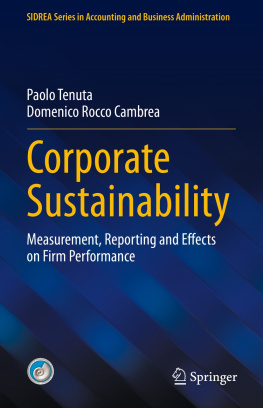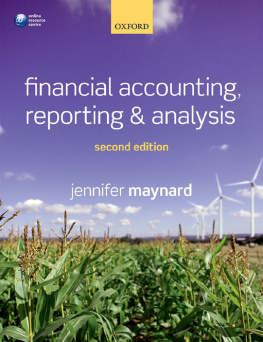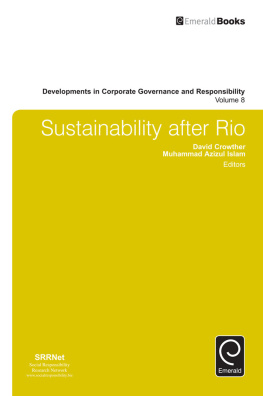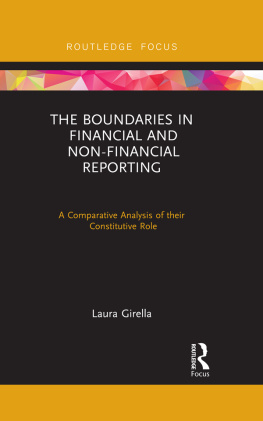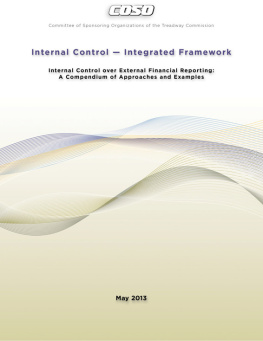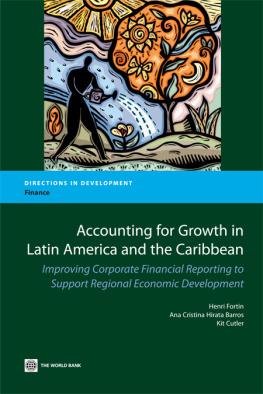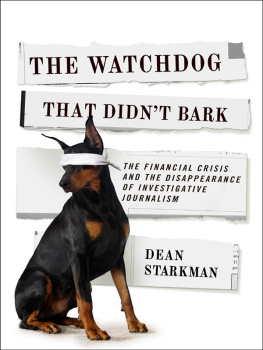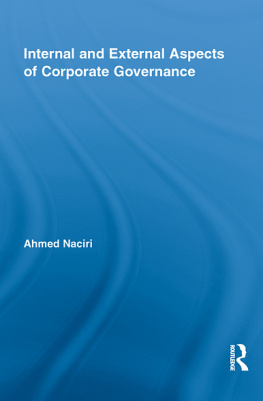A Social Critique of Corporate Reporting
A semiotic analysis of corporate financial and environmental reporting
DAVID CROWTHER
University of North London
First published 2002 by Ashgate Publishing
Reissued 2018 by Routledge
2 Park Square, Milton Park, Abingdon, Oxon OX14 4RN
711 Third Avenue, New York, NY 10017, USA
Routledge is an imprint of the Taylor & Francis Group, an informa business
Copyright David Crowther 2002
The author has asserted his moral right under the Copyright, Designs and Patents Act, 1988, to be identified as the author of this work.
All rights reserved. No part of this book may be reprinted or reproduced or utilised in any form or by any electronic, mechanical, or other means, now known or hereafter invented, including photocopying and recording, or in any information storage or retrieval system, without permission in writing from the publishers.
Notice:
Product or corporate names may be trademarks or registered trademarks, and are used only for identification and explanation without intent to infringe.
Publishers Note
The publisher has gone to great lengths to ensure the quality of this reprint but points out that some imperfections in the original copies may be apparent.
Disclaimer
The publisher has made every effort to trace copyright holders and welcomes correspondence from those they have been unable to contact.
A Library of Congress record exists under LC control number: 2001098451
ISBN 13: 978-1-138-73623-8 (hbk)
ISBN 13: 978-1-315-18604-7 (ebk)
Chapter 1
The Function of Corporate Reporting
Introduction
This book is concerned with the role of corporate reporting in UK public limited companies. Depending upon the perspective one takes, this communication may be to the owners of the business (ie the shareholders), the investors in the business, prospective future investors in the business, orto any permutation or combination of stakeholders who are associated with the business in any way. Indeed this communication may even be to society at large on the basis that all members of society are either present or potential stakeholders in the business (Crowther 1996b).
It is a common assumption that the most significant part of any corporate report is the accounting information which is contained therein. This book however takes a very different view of corporate reporting. The central argument to is that the purpose of corporate reporting has changed from one primarily of stewardship and accountability to shareholders to a more outward looking and forward looking perspective. It will be argued that one of the driving forces for this change in orientation has been the discourse of environmental accounting but that other forces are also involved.
Throughout, reference is made to the managers of a business. In the context of this work the term manager is used as a shorthand term to identify the non-owning salary-taking elite who form the dominant decision taking coalition at the centre of the organisation. Additionally they may not comprise all the people in the most senior echelons of an organisation; their identification as a part of this group is dependant upon their centrality to the decision making process in the organisation and to the control of the use of resources within the organisation. As such it is evident that the precise grouping of such managers may not be known to external parties but will be clearly identified within any organisation, particularly by managers whether within the group or excluded, and this group of managers will vary in composition from one company to another.
The argument throughout this book is essentially explorative and is concerned with looking at different aspects of the changes in corporate reporting and taking different perspectives in the development of the argument. As such it seeks to provide evidence to negate some of the commonly held conceptions concerning corporate reporting. The argument has been developed without the need to adopt any particular position but rather to focus upon the evidence and arguments within the discourse. Thus the standpoint taken in the development of the argument is that simplification through the identification of underlying structures (Levi-Strauss 1961) with its consequent simplification and omission of data and analysis at variance with the central structure is insufficient to fully develop an understanding. Instead the argument of Deleuze and Guattari (1994) that it is the exceptions and variances which are significant to an understanding is used. Hence the argument is advanced from a post-structuralist perspective on the basis that the world is complex rather than simple and is subject to different interpretations from different perspectives. Indeed it is argued that although post-structuralism and postmodernism are presented as different from structuralism and modernism, they are in fact actually situated within the modernism / structuralism discourse. They are therefore different manifestations of the same discourse, focussing upon the complexity pole of one of the principal binarisms of modernity rather than the simplicity pole. Thus the viewpoint adopted in this book might seem conflicting according to many worldviews but the integrated viewpoint adopted is considered to be coherent and makes for a richer understanding of the subject matter considered. Indeed even the dialectics inherent within structuralism (Levi-Strauss 1972) are accepted and used in the arguments of this book. The development of the argument and the reasons for using the different perspectives selected, and exclusion of other perspectives, are explained and developed within the appropriate chapters within the book.
A starting point tor the development ot the argument concerning the changing nature and purpose of corporate reporting must however be commenced with a consideration of the historic development of such reporting, as an archaeology.
The Archaeology of Corporate Reporting
It has been argued (Crowther & Carter 1998) that the world changed at the time of the Enlightenment into one in which the individual assumed dominance. It is into this world that modern accounting was born on the basis that there was a need to record the actions of the individual and its effects as a basis for the planning of future action. This need was brought about by the need for a separation of the public and private actions of an individual and the need to record, and account for, the public actions because of the involvement of others in these public actions. Thus the Medieval methods of bookkeeping, with the indistinguishability of public from private actions, was inappropriate to this Modern world in which Capitalist enterprise was beginning to arise. Capitalism required the ability to precisely measure activities and this was the founding basis of management accounting. Indeed it has been argued (Sombart 1915) that capitalism would not have been possible without the techniques of double entry bookkeeping and its subsequent metamorphosis into management accounting. This accounting provided the mechanism to make visible the activities of all involved in the capitalist enterprise and to both record the effects of past actions and the expected results of future actions.


